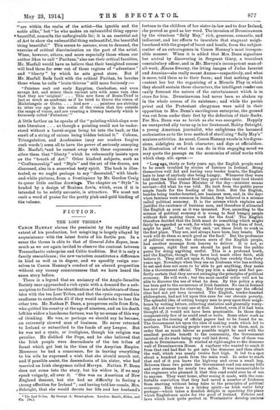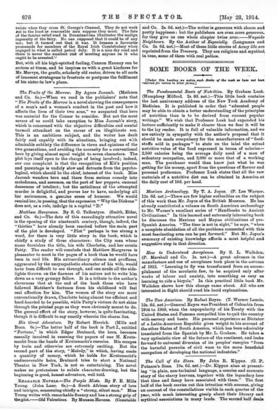FICTION.
THE LOST TRIBES.*
CANON HANNAY alarms the pessimist by the rapidity and extent of his production, but misgiving is largely allayed by acquaintance with the latest fruits of his fertile pen. In a sense the theme is akin to that of General John Regan, inas- much as we are again invited to observe the contrast between Transatlantic enterprise and Celtic tradition. But it is only a Serially resemblance ; the new variation constitutes a difference in kind as well as in degree, and we speedily resign our-
• selves to Canon Hannay's conduct of an absurd proposition -without any uneasy consciousness that we have heard the -same story before.
• There is a legend that an emissary of the Anglo-Israelite Society once approached a rich cynic with a demand for a sub- scription to further the identification of the inhabitants of these isles with the ten Lost Tribes, and that the cynic expressed his
• 'eudiness to contribute £5 if they would undertake to lose the 'other two. Mr. Nathan P. Dann, a prosperous exile from Erin, who quitted his country at the age of nineteen, and on his death left his widow a handsome fortune, was by no means of this 'way uf thinking. He was, or perhaps we should say he became, an extremely shrewd man of business. He never returned to Ireland or subscribed to the funds of any League. But he was not a cynic, or irreligious, though his religion was peculiar. He disliked the Pope, and he also believed that the Irish people were descendants of the ten tribes of Israel which got lost in the time of the Assyrian Empire. Moreover. be had a conscience, for in leaving everything to his wife he expressed a wish that she should search out, and if possible assist, the descendants of his. sister, who bad married an Irish clergyman called Mervyn. Nathan P. Dann does not come into the story, but his widow is, if we may speak vulgarly, all over it. "She was an American of New England descent, but she bad no difficulty in feeling a strong affection for Ireland "; and having told bee cousin, Mrs. Sebright, that she would denote her life and her husband's • The Lost Tribes. By George A. Birmingham. Loudon: Smith, Elder, nod 4Ea ftis.1
fortune to the children of her sister-in-law and to dear Ireland, the proved as good as her word. The invasion of Druminawona by the vivacious "Sally May," rich, generous, romantic, and indiscreet, and her efforts to inoculate that stagnant neigh- bourhood with the gospel of boost and hustle, form the subject- matter of an extravaganza in Canon Hannay's most irrespon- sible manner. When it is added that Mrs. Dann signalizes her arrival by discovering in Sergeant Ginty, a truculent constabulary officer, and in Mr. Mervyn's incompetent man-of-
/Eneas Sweeny, the living images of Judas Iscariot and Ananias—she really meant Annas—respectively, and what is more, told them so to their faces ; and that nothing would content her but the organizing of a Miracle Play in which they should sustain those characters, the intelligent reader can easily forecast the nature of the entertainment which is in store for him. Druminawona had never been an shaken up in the whole course of its existence ; and while the parish priest and the Protestant clergyman were solid in their opposition to Mrs. Dann's sacrilegious enterprise, the ground was cut from under their feet by the defection of their flocks. For Mrs. Dann was as lavish as site was energetic. Happily an unexpected ally turns up in her lieutenant, Bobby Sebright, a young American journalist, who enlightens the harassed ecclesiastics as to the true method of sterilizing " Sally May's" noxious activities. As usual, Canon Hannay excels in his digres- sions, sidelights on Irish character, and digs at officialdom. In illustration of what he can do in this engaging mood we may quote the passage on the economics of relief works with which chap. xiii. opens :— " Long age, thirty or forty years ago, the English people used to be much troubled by stories of famines in Ireland. Being themselves well fed and having very tender hearts, the English hate to hear of anybody else being hungry. Whenever they were told that the Irish wanted food they gave orders that food should be provided. The Prime Minister of the day—minister means servant—did what be was told. He took from the public purse ample funds for the feeding of the Irish. But the English, besides being tender-hearted, are business men, and, in the days when famines were common in Ireland, they believed in a science called political economy. It is the science which explains and justifies the existence of business men, and therefore it attracted the English as soon as it was invented. Now, according to the science of political economy it is wrong to feed hungry people without first making them work for the food.' The English therefore decided that the Irish must do something which might fairly be regarded as work, for which wages, in the form of food, might be paid. 'Let us,' they said, 'set these Irish to work in the first place. They are, and always have been, lazy beasts. The work will do them as much good as the food.' But the professors of political economy, the chosen seers of the English people, had another message from heaven to deliver. It is not, so it appears, right that men should be paid from the publics purse for doing anything useful. This is a profound truth, and the English, though they have lost much other faith, still believe it. They still act upon it, though less crudely than forty years ago. Nowadays when they see an Irishman who has nothing to eat and does not seem to be able to get anything, they make him a Government official. They pay him a salary and feel per- fectly certain that they are not outraging the principles of political economy. He will work ; but the most careful critic+ will not be able to discover the use of what he does. By this policy a stop has been put to the occurrence of Irish famines. No one in Ireland has now any excuse for etarving. But forty years ago the official class had not yet been invented. The English, tender-hearted philosophers, had not hit upon this cure for our chronic poverty. The splendid idea of setting hungry men to prey upon their neigh- bours by writing letters, collecting statistics and generally worry- ing, did not occur to any one at first. Indeed, even if it had been thought of, it would not have been practicable. In those days comparatively few of us could read or write. Some other work as useless as the issuing of official papers had to be found for us. The Government hit upon the idea of making roads which led to nowhere. The starving people were set to work on them, and, in order that as much labour as possible might be used with the smallest possible benefit to the community, the Government insisted on its roads being very well laid down. One of them was made in Druminawona. It started at right-angles to the demesne wall of Druminawona House. A wayfarer who wanted to reach it from that end had first to get into the demesne and then climb the wall, which was nearly twelve feet high. It led to a spot about a hundred yards from the main road. In order to reach that end of it you leave the highway and cross a small bog. Between these two points the Government road ran among hills and over streams for nearly two miles. It was inconceivable to the engineers who planned it that this road could ever be of use to anyone. They went home, after seeing it made, with the com- fortable conviction that they had saved a number of Irishmen from starving without being false to the principles of political economy. But there is a tricksy spirit—an Irish water fairy perhaps—which takes a fiendish delight in upsetting the plans which Englishmen make for the good of Ireland. Policies and laws which' look quite perfect in Westminster develop curious. twists when they cross St.' George's Channel. They do not work gut in the least as reasonable wee suppose they must. The fate of shegamine relief road in Drumiaawona illustrates the malign ingenuity of the fairy. No one supposed that it could be of any use; but it turned out that it was. It became a favourite promenade for members of the Royal Irish Constabulary when engaged in what is called patrol duty. It is a nice dry road and there is never the smallest risk of meeting anyone on it who ought to be arrested::
But, with all his- hig6spitited fooling, Cannon Hannay can be serious at times, and he inspires on with a great kindness for Mr. Mervyn, the gentle, scholarly old rector, driven to all sorts of inneoent stratagemato frustrate or postpone the fulfilment of his sisterin law's plans.















































 Previous page
Previous page